国际学术会议常用语英语
英语国际会议交流用语

英语国际会议交流用语以下是一些常用的英语国际会议交流用语:1. Opening remarks/Welcome address:- Ladies and gentlemen, welcome to [conference name].- It is an honor to address you all at this prestigious conference.- I would like to extend a warm welcome to all the participants.2. Introducing oneself/Introducing a speaker:- My name is [name], and I am the [position] of[company/organization].- It is my pleasure to introduce our next speaker, [name].3. Presenting the agenda:- Let's move on to the first item on the agenda.- The agenda for today's conference includes several important topics.- We will be discussing [topic] in the first session.4. Giving a presentation:- I would like to share some key findings from our recent research. - This presentation aims to provide an overview of our company's achievements.- I will be talking about the challenges and opportunities in the [industry/field].5. Asking for clarification/Seeking further information:- Could you please clarify your point about [topic]?- I would appreciate more details about [aspect of the presentation].- Can you provide some examples to support your argument?6. Offering opinions/Contributing to the discussion:- In my opinion, it is crucial to prioritize sustainability in our business practices.- I believe that the proposed strategy will lead to significant growth. - I would like to suggest an alternative approach to solve the problem.7. Agreeing/disagreeing:- I fully agree with the point made by the previous speaker.- I respectfully disagree with the assertion that [statement].- While I understand the argument, I think we should consider other factors.8. Summarizing/Concluding:- In summary, today's discussions have highlighted the need for collaboration.- To conclude, we have identified several action points to address the challenges.- I would like to thank all the participants for their valuable contributions.9. Closing remarks:- It has been a fruitful and engaging conference, and I hope you have found it beneficial.- I would like to express my gratitude to the organizing committee and everyone involved.- We look forward to meeting you again at the next conference.这些用语可以帮助您在国际会议上流利地交流和参与讨论。
最新国际学术会议常用语(英语)
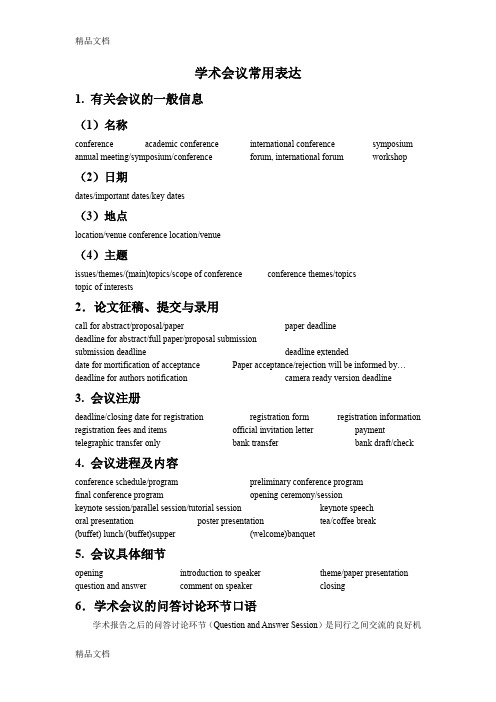
学术会议常用表达1. 有关会议的一般信息(1)名称conference academic conference international conference symposium annual meeting/symposium/conference forum, international forum workshop(2)日期dates/important dates/key dates(3)地点location/venue conference location/venue(4)主题issues/themes/(main)topics/scope of conference conference themes/topicstopic of interests2.论文征稿、提交与录用call for abstract/proposal/paper paper deadlinedeadline for abstract/full paper/proposal submissionsubmission deadline deadline extendeddate for mortification of acceptance Paper acceptance/rejection will be informed by…deadline for authors notification camera ready version deadline3. 会议注册deadline/closing date for registration registration form registration information registration fees and items official invitation letter payment telegraphic transfer only bank transfer bank draft/check4. 会议进程及内容conference schedule/program preliminary conference programfinal conference program opening ceremony/sessionkeynote session/parallel session/tutorial session keynote speechoral presentation poster presentation tea/coffee break (buffet) lunch/(buffet)supper (welcome)banquet5. 会议具体细节opening introduction to speaker theme/paper presentation question and answer comment on speaker closing6.学术会议的问答讨论环节口语学术报告之后的问答讨论环节(Question and Answer Session)是同行之间交流的良好机会,双方可以针对报告中的具体问题进行探讨(1)答问的方式与技巧回答讨论环节可以让报告人通过互动及时地获得信息反馈并可以把在讨论中或得的建设性建议用于下一步的工作,因此对科研工作有很大的促进作用。
国际学术会议常用语(英语)

学术会议常用表达1. 有关会议的一般信息(1)名称conference academic conference international conference symposium annual meeting/symposium/conference forum, international forum workshop(2)日期dates/important dates/key dates(3)地点location/venue conference location/venue(4)主题issues/themes/(main)topics/scope of conference conference themes/topicstopic of interests2.论文征稿、提交与录用call for abstract/proposal/paper paper deadlinedeadline for abstract/full paper/proposal submissionsubmission deadline deadline extendeddate for mortification of acceptance Paper acceptance/rejection will be informed by…deadline for authors notification camera ready version deadline3. 会议注册deadline/closing date for registration registration form registration information registration fees and items official invitation letter payment telegraphic transfer only bank transfer bank draft/check4. 会议进程及内容conference schedule/program preliminary conference programfinal conference program opening ceremony/sessionkeynote session/parallel session/tutorial session keynote speechoral presentation poster presentation tea/coffee break (buffet) lunch/(buffet)supper(welcome)banquet5. 会议具体细节opening introduction to speaker theme/paper presentation question and answer comment on speaker closing6.学术会议的问答讨论环节口语学术报告之后的问答讨论环节(Question and Answer Session)是同行之间交流的良好机会,双方可以针对报告中的具体问题进行探讨(1)答问的方式与技巧回答讨论环节可以让报告人通过互动及时地获得信息反馈并可以把在讨论中或得的建设性建议用于下一步的工作,因此对科研工作有很大的促进作用。
国际学术交流英语单词词汇
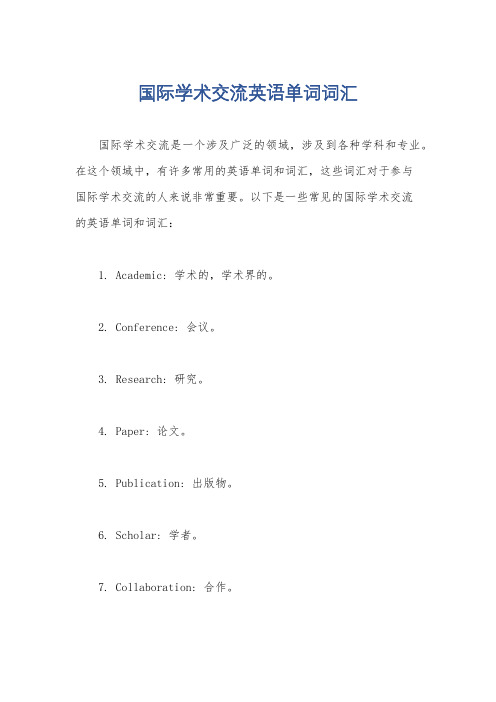
国际学术交流英语单词词汇国际学术交流是一个涉及广泛的领域,涉及到各种学科和专业。
在这个领域中,有许多常用的英语单词和词汇,这些词汇对于参与国际学术交流的人来说非常重要。
以下是一些常见的国际学术交流的英语单词和词汇:1. Academic: 学术的,学术界的。
2. Conference: 会议。
3. Research: 研究。
4. Paper: 论文。
5. Publication: 出版物。
6. Scholar: 学者。
7. Collaboration: 合作。
8. Presentation: 演讲,展示。
9. Abstract: 摘要。
10. Peer review: 同行评议。
11. Citation: 引用。
12. Thesis: 论文,论题。
13. Dissertation: 学位论文。
14. Plagiarism: 抄袭。
15. Academic integrity: 学术诚信。
16. Grant: 资助金,补助金。
17. Symposium: 座谈会,研讨会。
18. Panel: 小组讨论。
19. Academic journal: 学术期刊。
20. Academic writing: 学术写作。
这些词汇涵盖了国际学术交流中的各个方面,包括会议、研究、出版、合作等。
在国际学术交流中,熟悉并正确运用这些词汇是非常重要的,可以帮助人们更好地参与到国际学术交流中去。
同时,这些词汇也反映了国际学术交流的复杂性和多样性,需要人们具备丰富的词汇量和专业知识才能更好地融入这个领域。
希望以上信息对你有所帮助。
国际学术会议常用语(英语)
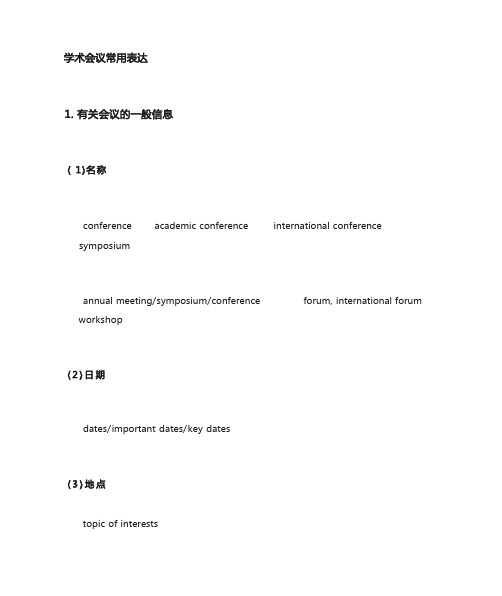
conference academic conference international conference symposiumannual meeting/symposium/conference forum, international forum workshopdates/important dates/key datestopic of interestslocation/venue conference location/venueissues/themes/(main)topics/scope of conferenceconference themes/topicstopic of interestscall for abstract/proposal/paper paper deadline deadline for abstract/full paper/proposal submissionsubmission deadlinedate for mortification of acceptanceinformed by…deadline for authors notificationdeadlinedeadline/closing date forregistration registration informationregistration fees and itemstelegraphic transfer onlydraft/checkdeadline extendedPaper acceptance/rejection will becamera ready version registration formofficial invitation letter bank transferpaymentbankconference schedule/program preliminary conference programfinal conference program opening ceremony/sessionkeynote session/parallel session/tutorial session keynote speechoral presentation poster presentation tea/coffee break(buffet) lunch/(buffet)supper (welcome)banquetopening introduction to speaker theme/paper presentationquestion and answer comment on speaker closing学术报告之后的问答讨论环节( Question and Answer Session )是同行之间交流的良好机会,双方可以针对报告中的具体问题进行探讨回答讨论环节可以让报告人通过互动及时地获得信息反馈并可以把在讨论中或得的建设性建议用于下一步的工作,因此对科研工作有很大的促进作用。
英语国际会议交流用语
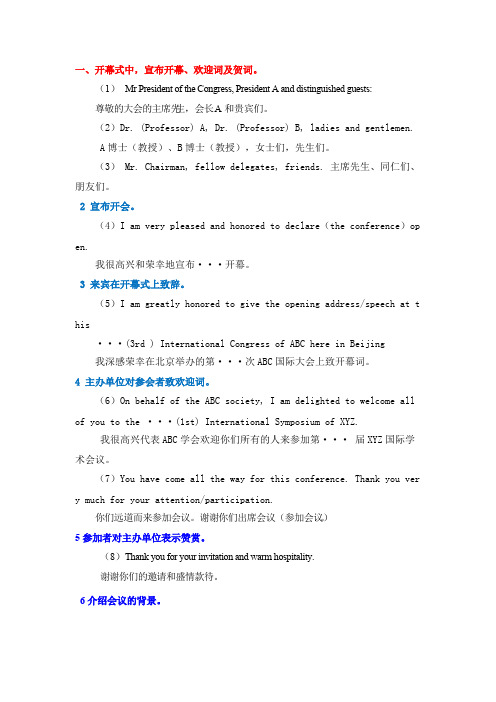
朋友们。 2 宣布开会。
(4)I am very pleased and honored to declare(the conference)op en.
我很高兴和荣幸地宣布···开幕。 3 来宾在开幕式上致辞。
(5)I am greatly honored to give the opening address/speech at t his
不幸地,我们要撤去二篇论文,即第 10 和第 11 篇。 (18)We have to reverse the order of No.5 and No.6. 时刻表有改变。第五篇和第六篇对调。 (19) There has been some change in the people listed on the program. Dr. A who was expected to present the second paper could not attend this m eeting, and Dr. B will present the paper. 列在节目单上的报告人已有些变动,原定由 A 博士报告的第二篇论文,因 (他)不能出席这个会议,而由 B 博士来报告。 二.主持报告用语 1.宣布开始和引导演讲 (20) The first paper this morning will be presented by Dr. A, professor of polymer science at XYZ University, and his topic is “ …(title)… “, Dr. A. 今天上午第一篇论文将由 XYZ 大学高分子科学教授 A 博士宣读。他的题目 是“…(题目)…“,A 博士。 (21)The next presentation in this session is on “…… (title)……”. I would like to call on [ask] Dr. A to talk this very important subject. 本会场下一个报告是:“……(题目)……”。我想请[要求]A 博士谈谈 这一十分重要的课题。
国际学术会议常用语英语
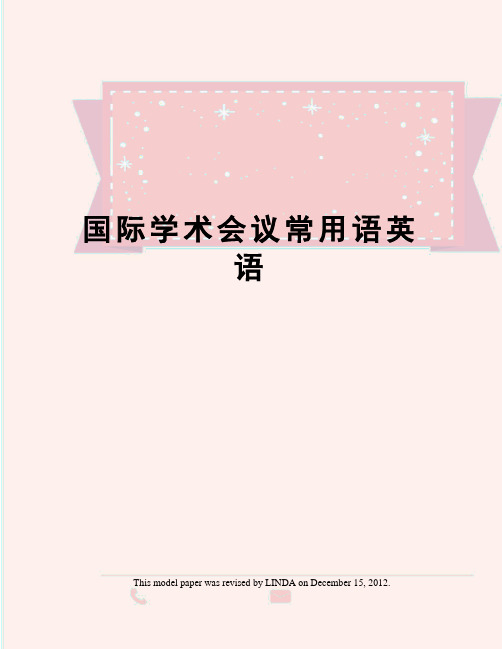
国际学术会议常用语英语This model paper was revised by LINDA on December 15, 2012.学术会议常用表达1. 有关会议的一般信息(1)名称conference academic conference international conference symposiumannual meeting/symposium/conference forum, international forum workshop(2)日期dates/important dates/key dates(3)地点location/venue conference location/venue(4)主题issues/themes/(main)topics/scope of conference conference themes/topics topic of interests2.论文征稿、提交与录用call for abstract/proposal/paper paper deadlinedeadline for abstract/full paper/proposal submissionsubmission deadline deadline extendeddate for mortification of acceptance Paper acceptance/rejectionwill be informed by…deadline for authors notification camera ready version deadline3. 会议注册deadline/closing date for registration registration form registration informationregistration fees and items official invitation letter paymenttelegraphic transfer only bank transferbank draft/check4. 会议进程及内容conference schedule/program preliminary conference programfinal conference program opening ceremony/session keynote session/parallel session/tutorial sessionkeynote speechoral presentation poster presentationtea/coffee break(buffet) lunch/(buffet)supper (welcome)banquet5. 会议具体细节opening introduction to speakertheme/paper presentationquestion and answer comment on speakerclosing6.学术会议的问答讨论环节口语学术报告之后的问答讨论环节(Question and Answer Session)是同行之间交流的良好机会,双方可以针对报告中的具体问题进行探讨(1)答问的方式与技巧回答讨论环节可以让报告人通过互动及时地获得信息反馈并可以把在讨论中或得的建设性建议用于下一步的工作,因此对科研工作有很大的促进作用。
国际学术会议常用语(英语)
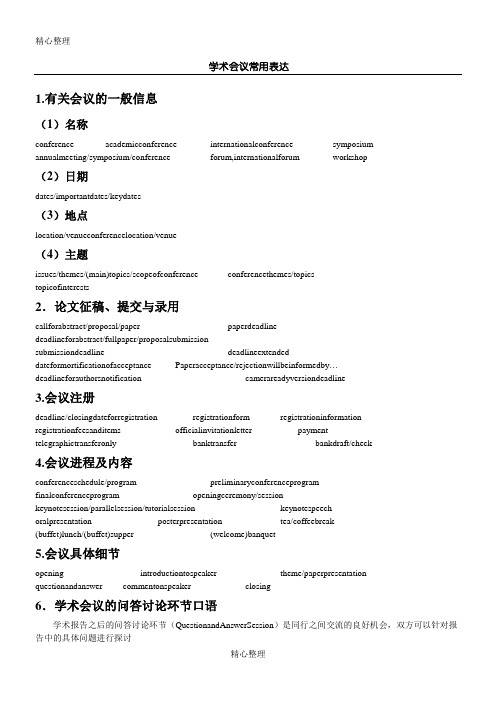
学术会议常用表达1.有关会议的一般信息(1)名称conference academicconference internationalconference symposiumannualmeeting/symposium/conference forum,internationalforum workshop(2)日期(3(423.4.keynotesession/parallelsession/tutorialsession keynotespeechoralpresentation posterpresentation tea/coffeebreak(buffet)lunch/(buffet)supper (welcome)banquet5.会议具体细节opening introductiontospeaker theme/paperpresentation questionandanswer commentonspeaker closing6.学术会议的问答讨论环节口语学术报告之后的问答讨论环节(QuestionandAnswerSession)是同行之间交流的良好机会,双方可以针对报告中的具体问题进行探讨(1)答问的方式与技巧回答讨论环节可以让报告人通过互动及时地获得信息反馈并可以把在讨论中或得的建设性建议用于下一步的工作,因此对科研工作有很大的促进作用。
对于如此重要的环节,报告人在报告之前应进行必要的准备,尽可能地保证这一环节完整、流畅地进行,一般应注意以下几点。
①准备工作学术报告中的提问者往往是相关领域中的专家,对报告的内容非常熟悉,因此所提出的问题可能会有相当的深度、广度以及不可预见性,有时甚至直接指出研究工作中的不完善之处或漏洞所在。
由于时间关系,回答者在现场一般没有充分的时间进行考虑,这就要求报告人要事先进行充分的准备。
在报告前,报告人应将对答环节的准备作为准备工作的一部分,进行深入考虑,全面的预测听众可能提出的问题,可以假设一些问题,并准备好最合适的解答。
- 1、下载文档前请自行甄别文档内容的完整性,平台不提供额外的编辑、内容补充、找答案等附加服务。
- 2、"仅部分预览"的文档,不可在线预览部分如存在完整性等问题,可反馈申请退款(可完整预览的文档不适用该条件!)。
- 3、如文档侵犯您的权益,请联系客服反馈,我们会尽快为您处理(人工客服工作时间:9:00-18:30)。
学术会议常用表达1. 有关会议的一般信息(1)名称conference academic conference international conference symposium annual meeting/symposium/conference forum, international forum workshop(2)日期dates/important dates/key dates(3)地点location/venue conference location/venue(4)主题issues/themes/(main)topics/scope of conference conference themes/topicstopic of interests2.论文征稿、提交与录用call for abstract/proposal/paper paper deadlinedeadline for abstract/full paper/proposal submissionsubmission deadline deadline extendeddate for mortification of acceptance Paper acceptance/rejection will be informed by…deadline for authors notification camera ready version deadline3. 会议注册deadline/closing date for registration registration form registration informationregistration fees and items official invitation letter payment telegraphic transfer only bank transfer bank draft/check 4. 会议进程及内容conference schedule/program preliminary conference programfinal conference program opening ceremony/sessionkeynote session/parallel session/tutorial session keynote speechoral presentation poster presentation tea/coffee break (buffet) lunch/(buffet)supper (welcome)banquet5. 会议具体细节opening introduction to speaker theme/paper presentation question and answer comment on speaker closing6.学术会议的问答讨论环节口语学术报告之后的问答讨论环节(Question and Answer Session)是同行之间交流的良好机会,双方可以针对报告中的具体问题进行探讨(1)答问的方式与技巧回答讨论环节可以让报告人通过互动及时地获得信息反馈并可以把在讨论中或得的建设性建议用于下一步的工作,因此对科研工作有很大的促进作用。
对于如此重要的环节,报告人在报告之前应进行必要的准备,尽可能地保证这一环节完整、流畅地进行,一般应注意以下几点。
①准备工作学术报告中的提问者往往是相关领域中的专家,对报告的内容非常熟悉,因此所提出的问题可能会有相当的深度、广度以及不可预见性,有时甚至直接指出研究工作中的不完善之处或漏洞所在。
由于时间关系,回答者在现场一般没有充分的时间进行考虑,这就要求报告人要事先进行充分的准备。
在报告前,报告人应将对答环节的准备作为准备工作的一部分,进行深入考虑,全面的预测听众可能提出的问题,可以假设一些问题,并准备好最合适的解答。
如果会议没有统一安排每个报告的问答环节,报告者在进行报告时就要预先告知听众随后的Q&A Session,这样可以让听众为提问做好准备。
②过程控制在时间允许的情况下尽可能让每个想提问的人都有机会提问,不要让少数提问者的提问占据整个讨论环节,应按照提问者举手示意的顺序来请出提问者。
在开始回答问题时,首先与提问者目光接触,然后转向其他所有听众,这样可以获得所有听众的注意。
在回答完毕之后,可以再次通过目光了解提问者是否对回答表示满意。
报告人应控制整个讨论的过程,对于与主题无关的问题可以礼貌地回避。
③答问方式应首先仔细听清问题,在回答之前应将问题清楚的重复一遍,这可以保证对问题的正确理解,确保每个人都能听清楚问题,同时给自己一些时间来思考,表述答案前可做片刻停留,这既引起了听众的注意,又表明了对答案的谨慎态度,同时也给自己留更多的思考空间。
不要对问题进行评价,避免说类似“That was a great question”的话,如果想要对某一问题进行肯定,可以用“Thanks for asking that question”或“I get asked that question by many people.”等中性的表述,还可以让听众感到平等。
回答问题时应尽可能简洁,切题。
在回答中应尽可能多地提及报告中的内容,这有利于听众对报告内容加深印象,并有利于控制问答环节的主题。
④问题的类型对于寻求具体解释的一些问题,可以简单地重复报告的内容来对问题进行说明或证明,或是澄清听众的误解。
如果提问者对报告内容提出不同见解,可以通过资料、事实、数据等来证明自己的观点,但一定注意态度要礼貌谦和。
对于过于复杂的深层问题无法进行简单回答时,可以在简略回答之后邀约提问者在其他时间进行讨论。
对于听众的评价或是建议应表示感谢,但要控制时间,适时地打断发言人并转入下一个问题。
对不知道答案的问题应坦率的承认,不要回避或转换话题,并尽可能提供相关的书籍,资料或是该方面的专家以供参考。
⑤时间的把握为了能够巧妙地结束回答问题环节,可事先准备一段总结性的陈述用来重申报告主题并结束问答环节。
注意在达到规定时间时应立刻结束讨论环节,在回答最后一个问题之前们就要礼貌地表示即将超时,并可以让其他提问者将问题留在会后进行讨论。
⑥提问者的礼仪大型会议中回答环节的时间往往比较短暂,提问者应抓住机会参与讨论,同时应注意以下方面。
如果为提问者准备了麦克风,则应在拿到麦克风后等待阿加安静下来在进行提问;大声地表述,让提问者和听众都能够听清楚问题;不必解释提问的理由以免浪费时间,但如果适宜可以需要地介绍自己(一定要简要);对所提的问题应做好准备,以保证问题的有效性(不要提那些答案显而易见的问题)提问务必简短;每次尽量只提一个问题,把更多的机会留给其他听众。
(2)常用表达①提问I would like to ask/address/raise a question about…I would like to know(whether)…I would be glad to know(whether)…I have a question about…May I ask (a question about)…?My question is/concerns//is concerned with…What I would like to ask is…What I am asking is …I wonder if you would like to explain/comment on the point of…I would be grateful/appreciate/obliged/for(to have) some explanation about…I wonder if you would be kind enough to explain/comment on/give some example for…I wonder (What I am wondering is)…I am curious about/interested in/keen on(whether/why/how/what/when)…?Could you please tell me whether/why/how/what/when…?Do you mind showing me whether/why/how/what/when…?I could not understand what you really mean by…Do you have any ideas about…?What do you think of/about…?Could you back…up?Could you give us an example about…?Could you provide any example to prove what you have said about…?Could you give any example that shows…?②回答a. 对问题进行确认Are you asking me the question about…?I am not quite about the question? Do you mean…?I am not quite sure what your question is. Could you address your question more specifically? What do you mean by…?I don’t known whether I have understood your question correctly. Do you mean….?b.肯定会否定的表示Yes. /I do.The answer is (not) correct/true/right…Exactly!Precisely!I think so.I think you’re right.I don’t think so.That is just what I mean.That is not what I mean.I (don’t) believe/consider/suppose/regard the viewpoint is true.Sure. /Absolutely. /Certainly. /Definitely.No, (absolutely/certainly/definitely) not.I’m in complete agreement.I (quite) agree.I couldn’t agree more.c. 正面回答My answer(to the question) is…To answer this question, I would like to say that…The direct/simple/brief answer to the question is…Let me answer your question by same examples of…I’d like to make a few comments on/explanation about…I think I can give you a few general comments on/explanation about…To comment on the question of you, I have made comparison between… and…I’d like to present/offer/give/express/state my opinion on…In my opinion, the conclusion can be supported by the experimental result that…To answer your question, I’d like to repeat what I said just know.I think this picture will be helpful for your understanding.Here, I’d like to explain it briefly.My idea is on the basis of two points. The first is…, and the second is…I will explain by some examples.d.非正面回答Now I can only present same estimation about that…As far as I know, little in-depth research has bean carried out yet.I can only provide/I have only a partial answer to that question.That’s one possible explanation, but not the only one.I’m afraid it’s a bit difficult for me to present some experimental data at the moment to support the theory since my idea is mainly out of theoretical consideration.I’m afraid the question is too complicated to be answered with a few words. I’d like to discuss it with you after the session.I think the answer to the question needs some further study.I’m afraid is not within the field of the presentation.I’m not sure if what you’re saying has any relevance here.I’m not sure if what you’re saying has anything to do with our problem.I’m not sure if what you’re saying really matters in this case.I’m not sure if what you’re saying is relevant to our problem.e. 无法回答时的表述I’m sorry my experience/knowledge about your question is very limited so I think I cannot give a good answer to your question.I’m sorry I really don’t know the answer to the question.Unfortunately I cannot answer the question at the moment.I’m afraid I have no idea how to answer your question (about that).Sorry, I’m afraid I know little about that matter, so I don’t think I can answer your question right now.It’s quite difficult for me to answer that question now.I can’t really recall; I’ll have to get back to you on that.I can’t quite remember; I’ll need to do a little checking and get back to you.I can’t fully remember; I’ll have to check up on it.I can’t recall all the facts; I’ll have to get back to you.f.回答之后的表述I wonder whether my question is helpful to you.Does that answer your question in a right way?Is my explanation clear enough?Is that what you wanted me to answer?Would anyone like to and anything (to what I’ve said)? Would anyone care to comment?Would anyone like to give their ideas on this?Would anyone care to add their thoughts(to the discussion)?。
